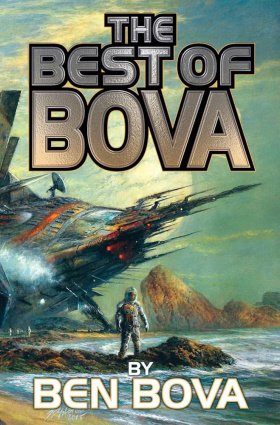
“A catholic, a Jew, and a Muslim are stuck in the middle of Mars,” said Rashid Faiyum.
“That isn’t funny,” Jacob Bernstein replied, wearily.
Patrick O’Connor, the leader of the three-man team, shook his head inside the helmet of his pressure suit. “Laugh and the world laughs with you, Jake.”
None of them could see the faces of their companions through the tinting of their helmet visors. But they could hear the bleakness in Bernstein’s tone. “There’s not much to laugh about, is there?”
“Not much,” Faiyum agreed.
All around them stretched the barren, frozen, rust-red sands of Utopia Planita. Their little hopper leaned lopsidedly on its three spindly legs in the middle of newly churned pockmarks from the meteor shower that had struck the area overnight.
Off on the horizon stood the blocky form of the old Viking 2 lander, which had been there for more than a century. One of their mission objectives had been to retrieve parts of the Viking to return to Earth, for study and eventual sale to a museum. Like everything else about their mission, that objective had been sidelined by the meteor shower. Their goal now was survival.
A barrage of tiny bits of stone, most of them no larger than dust motes. Once they had been part of an icy comet, but the ice had melted away after God-knew-how-many trips around the sun, and now only the stones were left when the remains of the comet happened to collide with the planet Mars.
One of the rare stones, almost the size of a pebble, had punctured the fuel cell that was the main electrical power source for the three-man hopper. Without the electrical power from that fuel cell, their rocket engine could not function. They were stranded in the middle of the frozen, arid plain.
In his gleaming silvery pressure suit, Faiyum reminded O’Connor of a knight in shining armor, except that he was bending into the bay that held the fuel cell, his helmeted head obscured by the bay’s upraised hatch. Bernstein, similarly suited, stood by nervously beside him.
The hatch had been punctured by what looked like a bullet hole. Faiyum was muttering, “Of all the meteoroids in all the solar system in all of Mars, this one’s got to smack our power cell.”
Bernstein asked, “How bad is it?”
Straightening up, Faiyum replied, “All the hydrogen drained out during the night. It’s dead as a doornail.”
“Then so are we,” Bernstein said.
“I’d better call Tithonium,” said O’Connor, and he headed for the ladder that led to the hopper’s cramped cockpit. “While the batteries are still good.”
“How long will they last?” asked Bernstein.
“Long enough to get help.”
It wasn’t that easy. The communications link back to Tithonium was relayed by a network of satellites in low orbit around Mars, and it would be another half hour before one of the commsats came over their horizon.
Faiyum and Bernstein followed O’Connor back into the cockpit, and suddenly the compact little space was uncomfortably crowded.
With nothing to do but wait, O’Connor said, “I’ll pressurize the cockpit so we can take off the helmets and have some breakfast.”
“I don’t think we should waste electrical power until we get confirmation from Tithonium that they’re sending a backup to us.”
“We’ve got to eat,” O’Connor said.
Sitting this close in the cramped cockpit, they could see each other’s faces even through the helmet visors’ tinting. Faiyum broke into a stubbly-chinned grin.
“Let’s pretend its Ramadan,” he suggested, “and we have to fast from sunup to sundown.”
“Like you fast during Ramadan,” Bernstein sniped. O’Connor remembered one of their first days on Mars, when a clean-shaven Faiyum had jokingly asked which direction Mecca was. O’Connor had pointed up.
“Let’s not waste power,” Bernstein repeated.
“We have enough power during the day,” Faiyum pointed out. “The solar panels work fine.”
Thanks to Mars’s thin, nearly cloudless atmosphere, just about the same amount of sunshine fell upon the surface of Mars as upon Earth, despite Mars’s farther distance from the sun. Thank God for that, O’Connor thought. Otherwise we’d be dead in a few hours.
Then he realized that, also thanks to Mars’s thin atmosphere, those micrometeoroids had made it all the way down to the ground to strafe them like a spray of bullets, instead of burning up from atmospheric friction, as they would have on Earth. The Lord giveth and the Lord taketh away, he told himself.
“Tithonium here,” a voice crackled through the speaker on the cockpit control panel. All three of them turned to the display screen, suddenly tight with expectation.
“What’s your situation, E-3?” asked the face in the screen. Ernie Roebuck, they recognized: chief communications engineer.
The main base for the exploration team was down at Tithonium Chasma, part of the immense Grand Canyon of Mars, more than three thousand kilometers from their Excursion 3 site.
O’Connor was the team’s astronaut: a thoroughly competent Boston Irishman with a genial disposition who tolerated the bantering of Faiyum and Bernstein—both geologists—and tried to keep them from developing a real animosity. A Muslim from Peoria and a New York Jew: how in the world had the psychologists back Earthside ever put the two of them on the same team, he wondered.
In the clipped jargon of professional fliers, O’Connor reported on their dead fuel cell.
“No power output at all?” Roebuck looked incredulous.
“Zero,” said O’Connor. “Hydrogen all leaked out overnight.”
“How did you get through the night?”
“The vehicle automatically switched to battery power.”

























